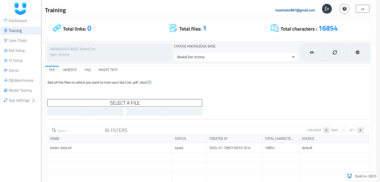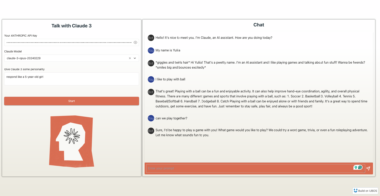MCP Chat Backend
This project is a serverless FastAPI backend for a chatbot that generates and executes SQL queries on a Postgres database using OpenAI’s GPT models, then returns structured, UI-friendly responses. It is designed to run on AWS Lambda via AWS SAM, but can also be run locally or in Docker.
Features
- FastAPI REST API with a single
/askendpoint - Uses OpenAI GPT models to generate and summarize SQL queries
- Connects to a Postgres (Supabase) database
- Returns structured JSON responses for easy frontend rendering
- CORS enabled for frontend integration
- Deployable to AWS Lambda (SAM), or run locally/Docker
- Verbose logging for debugging (CloudWatch)
Project Structure
├── main.py # Main FastAPI app and Lambda handler
├── requirements.txt # Python dependencies
├── template.yaml # AWS SAM template for Lambda deployment
├── samconfig.toml # AWS SAM deployment config
├── Dockerfile # For local/Docker deployment
├── .gitignore # Files to ignore in git
└── .env # (Not committed) Environment variables
Setup
1. Clone the repository
git clone <your-repo-url>
cd mcp-chat-3
2. Install Python dependencies
python -m venv .venv
source .venv/bin/activate # or .venvScriptsactivate on Windows
pip install -r requirements.txt
3. Set up environment variables
Create a .env file (not committed to git):
OPENAI_API_KEY=your-openai-key
SUPABASE_DB_NAME=your-db
SUPABASE_DB_USER=your-user
SUPABASE_DB_PASSWORD=your-password
SUPABASE_DB_HOST=your-host
SUPABASE_DB_PORT=your-port
Running Locally
With Uvicorn
uvicorn main:app --reload --port 8080
With Docker
docker build -t mcp-chat-backend .
docker run -p 8080:8080 --env-file .env mcp-chat-backend
Deploying to AWS Lambda (SAM)
- Install AWS SAM CLI
- Build and deploy:
sam build
sam deploy --guided
- Configure environment variables in
template.yamlor via the AWS Console. - The API will be available at the endpoint shown after deployment (e.g.
https://xxxxxx.execute-api.region.amazonaws.com/Prod/ask).
API Usage
POST /ask
- Body:
{ "question": "your question here" } - Response: Structured JSON for chatbot UI, e.g.
{
"messages": [
{
"type": "text",
"content": "Sample 588 has a resistance of 1.2 ohms.",
"entity": {
"entity_type": "sample",
"id": "588"
}
},
{
"type": "list",
"items": ["Item 1", "Item 2"]
}
]
}
- See
main.pyfor the full schema and more details.
Environment Variables
OPENAI_API_KEY: Your OpenAI API keySUPABASE_DB_NAME,SUPABASE_DB_USER,SUPABASE_DB_PASSWORD,SUPABASE_DB_HOST,SUPABASE_DB_PORT: Your Postgres database credentials
Development Notes
- All logs are sent to stdout (and CloudWatch on Lambda)
- CORS is enabled for all origins by default
- The backend expects the frontend to handle the structured response format
License
MIT (or your license here)
Chatbot SQL Query Backend
Project Details
- rick-noya/mcp-chatbot
- Last Updated: 4/25/2025
Recomended MCP Servers
A Model Context Protocol (MCP) server for converting files between different formats
Rest To Postman Collection MCP Server

pig 3.6 整合 ruoyi 3.8 前后端分离示意项目
MCP server for TouchDesigner


MCP Crew AI Server is a lightweight Python-based server designed to run, manage and create CrewAI workflows.

Break free of your MCP Client constraints

Penrose server for the Infinity-Topos environment
Capture live images from your webcam with a tool or resource request

An MCP Server for managing posts on Ghost CMS
 From vibe coding to vibe deployment. UBOS MCP turns ideas into infra with one message.
From vibe coding to vibe deployment. UBOS MCP turns ideas into infra with one message.






